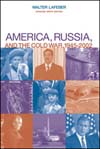

 America, Russia, and the Cold War 1945 - 2002: Updated, 9/e The World Turned Upside Down (2001) Primary Source Documents |
 2004 McGraw-Hill Higher Education
2004 McGraw-Hill Higher EducationAny use is subject to the Terms of Use and Privacy Policy.
McGraw-Hill Higher Education is one of the many fine businesses of The McGraw-Hill Companies.